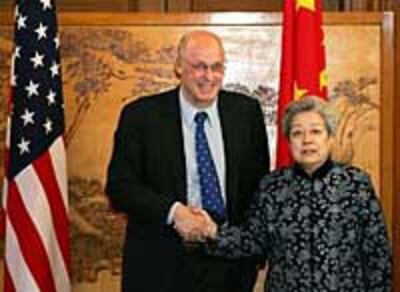
China has launched a buying mission to the United States in advance of “strategic economic dialogue” talks in Washington in May. But experts say the purchasing spree is aimed only at easing political pressure inside the U.S. for penalties provoked by China’s record trade surplus.
With U.S. pressure on Beijing growing, the Chinese tour opened on May 9 in San Francisco with the signing of 27 contracts for imports of high-tech products valued at U.S. $4.3 billion.
The buying group, led by Chinese Commerce Minister Ma Xiuhong, was scheduled to visit 24 cities in 23 U.S. states in a bid to improve trade relations before the Washington talks, set for May 23-24.
But most trade experts doubt the buying mission will make a dent in China’s huge trade surplus with the United States, which topped U.S. $232 billion last year.
A ‘clever strategy’
I think the object is to defuse some of the resentment that found its way into proposals for draconian measures.
Expectation is building that Senator Charles Schumer, a Democrat from New York, will sponsor new trade penalties with bipartisan support if China’s talks with U.S. Treasury Secretary Henry Paulson in May don't make progress.
In an interview with Radio Free Asia, June Dreyer—a China specialist and chair of the political science department at the University of Miami—said the import deals made in San Francisco are aimed more at relieving political pressure than at reducing China’s trade surplus.
“It’s a very clever strategy,” Dreyer said.
“I think the object is to defuse some of the resentment that found its way into [Schumer’s] proposals for draconian measures,” said Dreyer. “And if the Chinese can selectively pick off some of the support for that by buying things on the West Coast, then a couple of votes may change, and Schumer’s legislation will fail.”
China’s purchase of Microsoft software and other legally licensed items on the West Coast may help its claim that it is clamping down on intellectual property rights (IPR) violations, but China has a long way to go to deal with product piracy, Dreyer said.
Currency concerns
“I think that might help the argument, yes. If it’s actually going to convince the truly skeptical, I would be very surprised.”
Adam Segal, senior fellow for China studies at the Council on Foreign Relations in New York, agreed that China’s buying missions are an attempt to play U.S. politics rather than change the overall balance of trade.
But he added that this strategy will not sway many votes in Congress if new trade measures come to the floor.
“I think Schumer and the others who are pushing the bills down have pretty much drawn a line in the sand where the purchasing details aren’t going to do anything,” Segal said.
"They're going to look for something like revaluation of [China's currency] the renminbi, of the yuan, or some other much larger concession than just these purchasing details."
U.S. policymakers and congressional critics regularly cite China's currency policy as a major factor in the imbalance of trade, arguing that the yuan is artificially undervalued by up to 40 percent to make China's goods cheaper abroad.
Segal agreed that China is using its buying missions to send a cooperative message on trade, possibly because of U.S. complaints about Chinese trade practices made to the World Trade Organization (WTO) in February.
“I’m not sure whether in this specific case it’s a response to the WTO deals. Even if they do think so, I don’t think Washington itself is going to be receptive to the message.”
Original reporting by Michael Lelyveld. Edited for the Web by Richard Finney.
